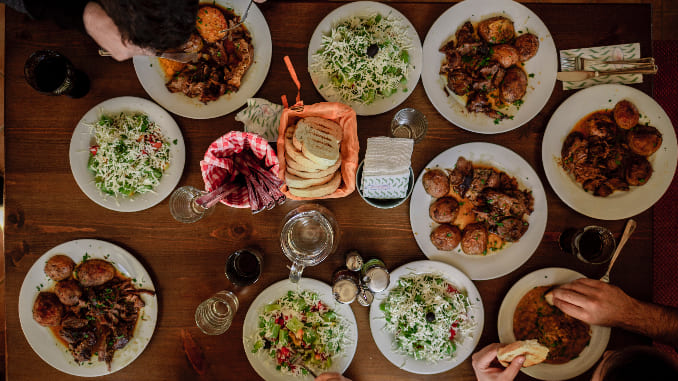
When I was 22 years old and freshly graduated from college, subsisting off of the cash I managed to scrape together writing ads for car dealerships and editing self-published business memoirs, I had a relatively tight grocery budget. I ate simply. Beans, pasta, cabbage, white rice and bananas made up the bulk of my diet, and a box of frozen veggie patties from Aldi felt like a treat. This was how I ate the majority of the time.
Occasionally during that period of my life, though, I would eat well, so well, in the company of friends. I lived with four roommates at the time, and we were all close. On some Saturday mornings, we would invite a group of friends over to cook breakfast. Suddenly, our usually sparse kitchen would transform into a bustling, messy workspace, empty eggshells littering the counters and bacon fat popping and splattering all over the cluttered electric stove.
When we had all finished cooking, when the slightly burnt toast had been buttered and the fragrant orange cantaloupe had been haphazardly cut into bite-sized pieces, we would sit down at our rickety Ikea table and pour each other mimosas made from last night’s leftover wine. These meals were always jubilant and abundant, sometimes loud and exuberant, other times relatively quiet and thoughtful, always someone new making an appearance. It was community.
I’m not religious, but these breakfasts served as a sort of church for me. They were a chance to gather, to convene, to celebrate with community. Even without the sermon, this ritual became a sort of balm for me, a respite from the averageness of the rest of the week. The frugality that informed most of the meals I ate at that time was blissfully forgotten for a few hours—those of us who could would splurge on fancy cheese or freshly squeezed juice or a massive tub of berries to share with our friends. I felt so grateful for the privilege of these occasional luxuries.
Once several of us moved across the country and got slightly better-paying jobs, the Saturday morning breakfast ceased to be a regular event, and I was suddenly able to splurge at the grocery store on a more regular basis. But I’d be lying if I said I didn’t miss the interplay of frugality and occasional, ritual indulgence in the company of people I love.
It’s no wonder I was so captured by the idea of Eikas the first time I read about it. Eikas is a monthly gathering in celebration of the philosopher Epicurus and his school of thought. If you’re like me, when you hear the term “Epicurean,” you first think of fine dining, of luxury, of opulence, but our popular idea of Epicureanism doesn’t have much to do with the actual philosophy itself. Rather, Epicurus peddled a kind of restrained hedonism. He believed that pleasure was the ultimate good, but he understood that the endless pursuit of money, sex and power didn’t result in true pleasure. His diet was reflective of this mindset: Instead of regularly indulging in meat, which, at the time, was reserved for the very wealthy, Epicurus enjoyed a diet of bread, olives and small doses of cheese.
But once a month, on the 20th, Epicurus would gather his followers and have a feast “celebrating philosophy, community and food; Though Epicurus opted for a simple diet on most days of the month, he advocated for ritual culinary indulgence. An important facet of this indulgence, though, was enjoying it in the presence of community. Epicurus once said, “We should look for someone to eat and drink with before looking for something to eat and drink, for dining alone is leading the life of a lion or wolf.”
Epicureanism is a philosophy, not a religion, but Eikas reminds me of religious traditions that encourage ritualized human connection; some practicing Jews commit to intimacy with their partner during Shabbat. By adhering to a system of belief, you’re also making a commitment to connection. Some modern-day Epicureans even cast Eikas in an almost religious light: The Society of Friends of Epicurus say that they “view the 20th as an Epicurean sabbath. It is our connection to those who came before us, our statement of willful continuity and our gift to the Epicureans of the present and the future.”
Our current food culture does not represent this vision. Food media is flooded with projections of luxury. Carbone! Caviar bumps! Central! At the same time, we’re eating alone more now than ever. And while there is real joy in the solo meal, a joy that many of us were forced to tap into during the pandemic, I can’t personally say that I enjoyed my most elaborate quarantine meals more than the cobbled-together breakfasts I ate with friends during my first few years post-college. Learning about Eikas made me think about how often I have people over for dinner these days. Like a lot of people, since the pandemic, my kitchen has gotten quieter.
I’m not necessarily saying that we should all become Epicureans or that we should all be hosting monthly dinner parties. (I’m not saying that we shouldn’t, either.) But I think a food ethic in which restraint is exercised and savored and indulgence is reserved for opportunities for community-building could be a model for a more sustainable—and maybe even more enjoyable—sort of sustenance.